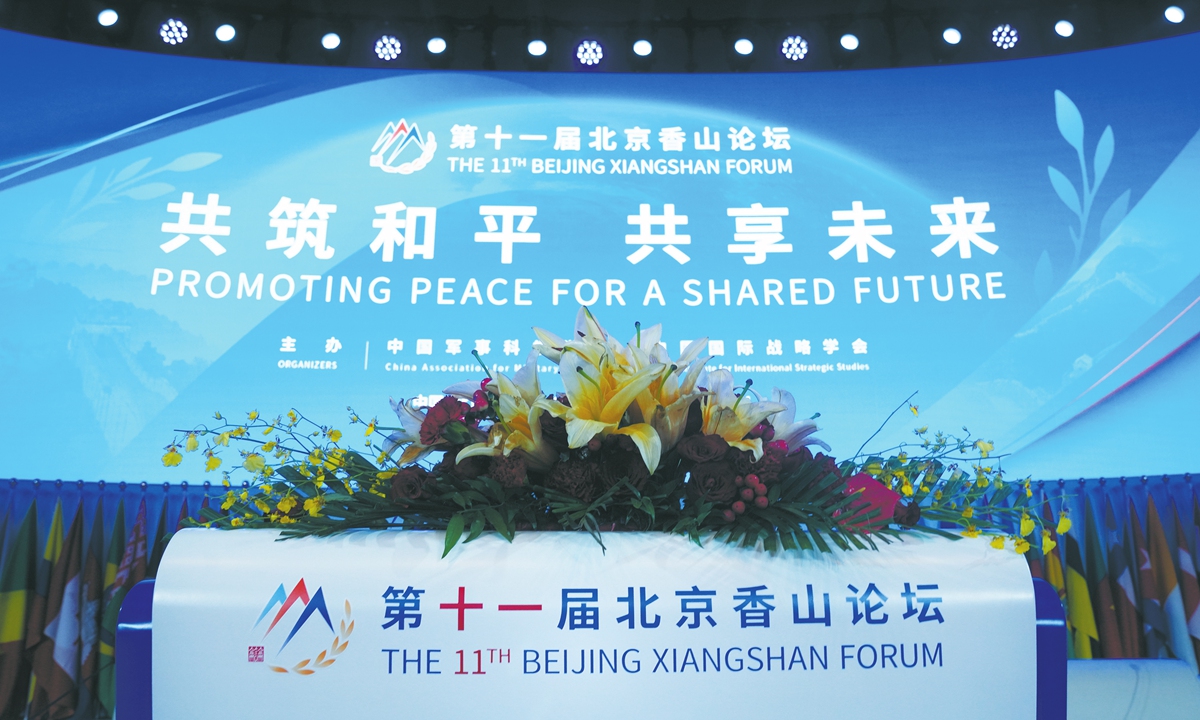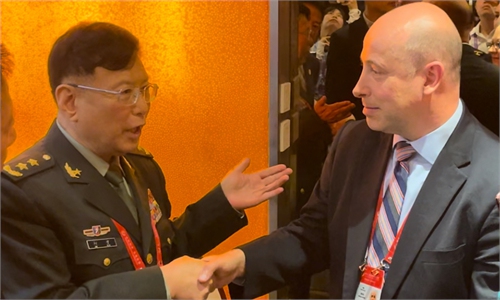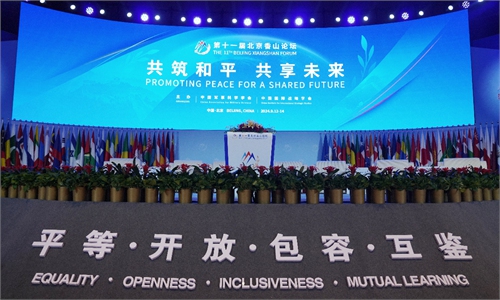
The 11th Beijing Xiangshan Forum is held at the Beijing International Convention Center from September 12 to 14, 2024. Photo: VCG
Editor's Note:
The trajectory of China-US military relations is consistent with the broader development of bilateral ties, which are currently stabilizing, Yao Yunzhu (Yao), retired major general of the People's Liberation Army (PLA) of China and a senior advisor to the China Association of Military Sciences, told Global Times (GT) executive editor Chen Ping and reporter Li Aixin during the ongoing 11th Beijing Xiangshan Forum (BXF). Despite the progress made in China-US military interactions, Yao expressed concerns over the South China Sea issue. She emphasized that the US and the Philippines should have a clear understanding of the situation in the South China Sea, as China is steadfast in defending its territorial sovereignty and maritime rights, backed by substantial capabilities.
GT: How do you view the current state of military exchanges between China and the US? In late August, General Zhang Youxia, vice chairman of the CPC Central Military Commission, met with US National Security Advisor Jake Sullivan during Sullivan's visit to China. Currently, Michael Chase, US deputy assistant secretary of defense for China, is participating in the BXF. What is the significance of the recent communications for the military relationship between China and the US?
Yao: During the China-US San Francisco summit in November last year, leaders from the two countries agreed on a series of important consensus regarding military cooperation. These included restoring high-level military communications based on equality and respect, resuming the China-US Defense Policy Coordination Talks, and the China-US Military Maritime Consultative Agreement meetings, and conducting telephone conversations between theater commanders. Wu Ya'nan, commander of the Chinese PLA Southern Theater Command, recently had a video talk with Samuel J. Paparo, commander of the US Indo-Pacific Command, marking the introduction of a new communication mechanism between the two militaries. So far, it can be said that all four aspects of the military relationship agreed upon at the San Francisco summit have been implemented.
Overall, the trajectory of China-US military relations is consistent with the broader development of bilateral ties, which are currently stabilizing. However, since the US has not yet abandoned its strategy of military containment against China, cannot resist its urge to use military alliances to pressure China, and has not ceased its provocative actions - such as high-intensity reconnaissance, the so-called freedom of navigation operations, and joint exercises with its allies near China - we should have realistic expectations about the improvement of military relations between the two countries.
The BXF is an annual event focused on defense and security, constituting a platform for global participation. It welcomes active engagement from countries around the world and encourages dialogues among all attendees on an equal footing. The forum avoids ideological divisions and camp polarization, aiming to facilitate rational expressions of diverse perspectives and viewpoints.
Like other countries, the US receives an invitation to the forum each year, with decisions about participation and the level of attending officials determined by the US side. Missing an opportunity to communicate with China and over 100 other countries, as well as the chance to understand China and hear global perspectives is a loss for any country. Therefore, in recent years, US participation in the BXF has become increasingly substantive. Initially, the US viewed its involvement as an academic exchange, sending a delegation led by a dean from a college of US National Defense University. Over time, it began sending officials from the Department of Defense responsible for China affairs, reflecting a more serious commitment. In recent years, the US has generally maintained this level of participation in the BXF.

Major general Yao Yunzhu Photo: Courtesy of Yao
GT: You mentioned the recent video talk between commanders of the Chinese PLA Southern Theater Command and the US Indo-Pacific Command. The PLA Southern Theater Command oversees the maintenance of stability in the South China Sea. In your view, what is crucial for alleviating the current tensions in the South China Sea?
Yao: The US and the Philippines should have a clear understanding of the situation in the South China Sea. China is steadfast in defending its territorial sovereignty and maritime rights, backed by substantial capabilities. At the same time, China's policy of resolving South China Sea disputes peacefully remains consistent and unchanged. Attempts to exploit mutual defense treaties with major military powers to illegally seize maritime territory, or to use territorial disputes with other countries to militarily contain China, will not succeed. Instead, such actions are likely to escalate tensions, increase the risk of military conflict, and ultimately harm others without benefiting oneself.
GT: In the military field, what do you think is the biggest misjudgment regarding China? To what extent can the US military overcome cognitive biases and escape its misjudgments?
Yao: Since the US views China as a "competitor," it naturally treats the Chinese military as both a peacetime adversary and a potential rival in conflict. This misjudgment stems from a flawed understanding of China. I hope this misjudgment can be corrected, though I acknowledge that overcoming cognitive biases will be challenging for the US. I encourage increased dialogue through platforms like the BXF, which can foster more exchanges between the Chinese military and the US military and academic communities, leading to a more accurate and objective understanding of China.
GT: What areas can the Chinese and US militaries cooperate in? How can their collaboration contribute to world peace?
Yao: There are many areas where the Chinese and US militaries can cooperate. For example, they could work together on global security, addressing issues such as climate change, humanitarian aid during disasters, UN peacekeeping missions, global counterterrorism, preventing the spread of weapons of mass destruction, military medicine, and promoting environmental and green practices in military activities. Whether such cooperation is possible depends largely on whether the two sides can view each other correctly and have the willingness to collaborate. As the saying goes, "Where there's a will, there's a way." In the case of misjudgment, areas intended for cooperation may instead become fields of competition.



